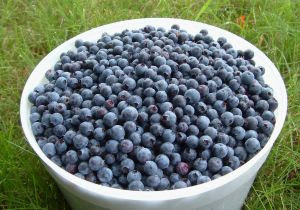We have gone blueberry picking at nearby pick-your-own farms nearly every year since moving to Tennessee. Since I am trying to grow almost all of our own produce this year, blueberries definitely go into the garden. Blueberries are very high in beneficial antioxidents and we eat them plain for snacks, in yogurt, in cereal, and in pancakes. For your sweet tooth they are delicious paired with white chocolate, which I do sometimes in pancakes (by throwing a handful of white chocolate chips into the batter) and in these awesome blueberry white chocolate chip cookies.
It's time to talk about blueberries right now because they like to be planted best when they are dormant, which lasts from about November until March. Here are a few basic facts to know about blueberry plants:
- The more mature your plant is that you buy, the sooner you will get high yields of fruit from it.
- There are rabbiteye and highbush blueberries. Rabbiteyes grow well in southern US. They grow well in warmer, dryer temps. The fruit is small and sweet, and grows later in the season. The plant is covered in a waxy residue, reducing water loss. Watering is not necessary, particularly if you mulch them. Highbushes grow well in the northern US, at high elevation, good rainfall, and where really high temps do not occur. They have a high water-loss rate and require regular watering. Fruit matures earlier than rabbiteye and is larger and not as sweet.
- Good varieties of rabbiteyes are: Tifblue, Garden Blue, Climax, Southland, Bluebelle and Brightblue.
- Good varieties of highbushes are: Blueray, Herbert, Coville, Bluecrop, Berkeley and Jersey.
- Blueberry plants can grow 8 - 10 feet tall, but can be pruned as you like. Plants should be space 5 - 6 feet apart. At full growth they will produce a hedge at this spacing. Row spacing should be 10 - 12 feet. Make sure the hole you dig for your plant is bigger than the existing root system.
- You can grow blueberries in containers! Yippee! Use a gallon or two-gallon pot and make sure you mix some peat in with the soil for good drainage. Cut the roots a bit before planting to allow better root spread and development.
- Blueberry plants need level ground, as they will die quickly in standing water or frost. A raised garden is ideal to provide good drainage for blueberry plants. Mixing in peat moss with your soil will allow better moisture around the roots and enable quick establishment of new plants.
- Do not fertilize your new blueberry plants! This can kill young plants. It is not appropriate to fertilize until they have had their first flush of growth. Call your local extension or nursery to find out when to fertilize.
- You must have cross-pollination in order to produce fruit! Plant at least two different varieties and either alternate plants or rows of plants.
- Remove flowers on your new plants if there are any, so that your plant can concentrate its energy on good root growth and spread. Shape your plant by cutting stray branches and tips of branches to encourage good wood growth and establishment.
- Sawdust makes a good mulch to maintain the right pH for the plants.
- Blueberries do not die during winter (they just go dormant) and will come back each year. They are not prone to disease. Once established, you will get fruit for at least a decade or two.
I got all of this information from my local agricultural extension. If you have one near you, they are a wealth of gardening, landscaping, and yard information! Take advantage of it for sure.
My three kideos picking blueberries at a local pick-your-own farm:
This post is part of a weekly gardening series! Previous Spring posts include:

Singin' the blues!,







Those cookies sounds absolutely wonderful! I am considering going blueberry picking this year.
ReplyDeleteThe cookies are my fave now and that's saying something because I do love cookies. ;)
ReplyDeleteI enjoy blueberry picking because its yummy and something we can all do together. That said, it is extremely hot when blueberries are ready (at least here in TN) and the kids start complaining pretty quickly. It's also very economical though - you can pick a whole bucketfull for the price of a little basket from the grocery. And they are easy to freeze and later add to pancakes & smoothie anytime!